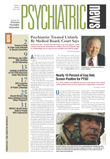After a 20-year push by elements of organized psychology, legislation to extend prescribing privileges to psychologists is advancing in the Hawaii legislature.
On March 7 the Hawaii House of Representatives approved a prescribing bill (HB 2589) to authorize “trained and supervised medical psychologists working in federally qualified health centers or other licensed health clinics located in federally designated medically underserved areas” to prescribe psychotropic medications. The prescriptive authority would sunset in 2013 unless legislators extend it.
The bill would require psychopharmacological training from an institution of higher learning approved by the state psychology board. It also would require a one-year supervised practicum involving 400 hours treating at least 100 patients with mental disorders. The practicum would be supervised by a“ licensed health care provider who is experienced in the provision of psychopharmacotherapy” (Psychiatric News, March 3).
The bill received lengthy debate in the House Consumer Protection and Commerce Committee, where witnesses opposing the bill included Naleen Andreade, M.D., chair of the University of Hawaii Department of Psychiatry, several other psychiatrists, psychologists, a nurse, the Board of Medical Examiners, Department of Health, NAMI, and several consumers.
The House Consumer Protection Committee acknowledged the potential dangers of psychologist prescribing by sharply limiting the medications that psychologists would be permitted to use under an “exclusionary formulary” to antidepressants, benzodiazepines, and possibly Ritalin and barbiturates.
The focus now moves to the Senate, where the bill was defeated last year. At press time, HB 2589 was amended further and passed by the Committee on Health, whose chair is lead sponsor of the Senate version of the bill. The bill was then referred to the Committee on Commerce, Consumer Protection, and Housing.
“The idea of replacing 12 years of medical education for physicians with 12 weeks of education for nonphysicians is ridiculous,” said Hawaii psychiatrist Jeffrey Akaka, M.D., who lobbied against such prescribing changes. “This is an attempt to get a license to do something psychologists are not qualified to do.” Akaka is recorder of the APA Assembly.
The bill's supporters urged its approval, maintaining that it would help combat a statewide health care access problem. Akaka said psychologists exploited this need and have pitched prescribing as the solution for 20 years. Akaka, medical director of the Diamond Head Community Mental Health Center, said the problem stems, in part, from the refusal of community health centers to hire psychiatrists.
APA President Steven Sharfstein, M.D., commented in an e-mail communication to APA members on the length of time that APA and the Hawaii Psychiatric Medical Association (HPMA) have fought against legislation to give psychologists prescribing privileges and praised HPMA's efforts in achieving victory for so long.
“Hawaii is the origin of the prescribing movement, which began more than 20 years ago... .HPMA has had to fight some 25 separate psychology prescribing bills in 1985, 1990/91, 1996/97/98, 2001/02/03/05 and 2006.... We stand with our colleagues in fighting this inappropriate and potentially dangerous legislation.”
He added that when this issue went to press, APA was well into the process of providing additional support as requested by HPMA.
If the legislation is defeated, psychiatrists hope a planned task force report, due out before the next legislative session, will include recommendations for a training program in a medical model for those with advanced but nonmedical degrees who want to prescribe, said Lydia Hemmings, executive director of HPMA.
A copy of HB 2589 is posted at<www.capitol.hawaii.gov/sessioncurrent/bills/hb539_htm>.▪
